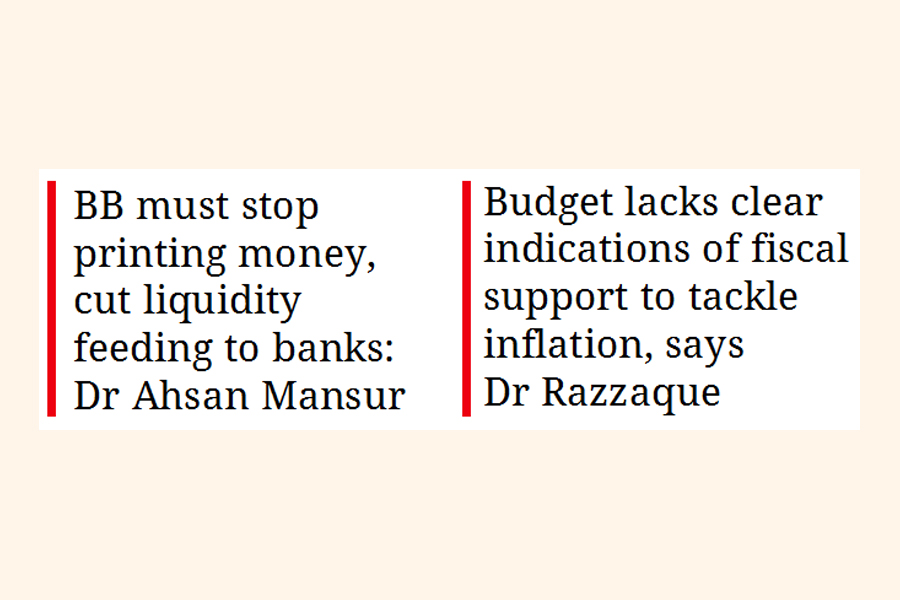
Published :
Updated :

Overall inflation in Bangladesh seemingly eases a bit, with the rate down by 0.17 percentage points to 9.72 per cent in June on a point-to-point basis, according to BBS count.
But food inflation remained over 10 per cent for three consecutive months-a sore point to common consumers.
The country's national statistical organisation or NSO-Bangladesh Bureau of Statistics (BBS)--- just released the latest inflation data measured on consumer price index.
Food inflation was recorded 10.42 per cent at national level, 10.39 per cent in rural areas and 10.54 per cent in urban areas in June last.
And the moving average or July 2023 and June 2024 average inflation stood at 9.73 per cent, up 2.23 percentage points from the revised inflation target for the fiscal year 2024.
Non-food inflation eased slightly to 9.15 per cent in June. According to BBS calculations, this inflation was 9.19 per cent in the previous month of May.
Bangladesh's economy has been experiencing higher inflation for around two years, although inflation lost steam across the world-in some countries nearing deflation.
The government and the central bank have taken various steps to curb the higher inflation. But the measures did not bear fruit yet. Rather, inflation remains high every passing month.
"Although this is the average price-surge measure on some given weights on the prices of goods, but the personal inflation would have been higher," says an economist.
Economists, however, welcome the reduction in the CPI inflation in June. But they appear confused as to whether this is due to the policy measures or not.
Bangladesh Bank has taken a slew of measures, including a raise in policy rate. It also liberalised the interest regime and introduced crawling-peg system in its bid to stabilise the forex market.
"If this is due to the central bank's measures, then it is ok," says Dr Ahsan H. Mansur, executive director of the Policy Research Institute of Bangladesh or PRI.
The economist suggests that the central bank must stop printing money-a major push to prices by way of supply of the fast buck in the economy.
"The liquidity support to certain banks also should have been reduced in order to contain in the inflation," says Dr Mansur.
"Otherwise the inflation will come back again."
Dr Mohammad Abdur Razzaque, chairman of RAPID (Research and Policy Integration for Development) Bangladesh, observes that the latest inflation figures show "the stubbornness of price trends, offering no respite for poor and middle-class consumers".
The RAPID chairman thinks the recent interest-rate hikes need more time to impact inflationary pressures significantly.
"Additionally, it is crucial to assess whether the contractionary monetary policy is effectively complemented by the fiscal policy stance."
In Dr Razzaque's view the recently passed budget lacks clear indications of fiscal support to tackle inflation.
"The continued emphasis on achieving high growth is misplaced, given the persistent inflationary pressure," he says about one point in his contentions over the budgetary measures.
"We must also examine any market imperfections sustaining high inflation."
Import restrictions aimed at addressing forex-reserves pressures are not helping to ease inflation either, the RAPID chairman adds.
jasimharoon@yahoo.com


 For all latest news, follow The Financial Express Google News channel.
For all latest news, follow The Financial Express Google News channel.